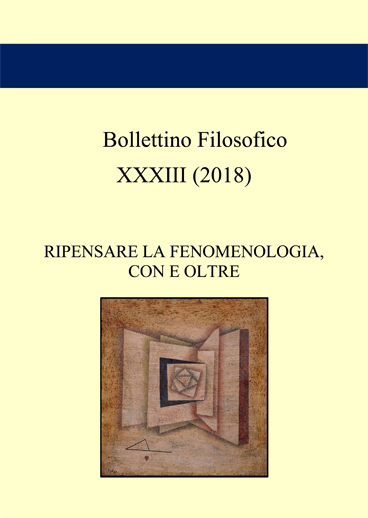Corpo e Spazio: Husserl, Merleau-Ponty, Lacan
Abstract
Starting from the analysis of the body in the phenomenological tradition, and by means of the mediation of Merleau-Ponty’s thought, the essay aims to address the Lacanian theorization of the body as a pulsional body, in which the phenomenological centrality of vision is traced back to the specific performance of the scopic pulsion. The essay will be divided into three parts. The first one will reconstruct the Husserlian theorization of the theme of the proper body (Leib) or living body, mainly from Ideas II, the lessons on passive synthesis, and those on the Crisis of European Sciences, in which the concept of “world of life” is put at stake. In the second part, after a few words on the Gestalt-psychology, the production of Maurice Merleau-Ponty will be analyzed starting from the Phenomenology of perception, passing through the Lessons on child psychology held at the Sorbonne in 1949 – in which the relationship with Lacan and more specifically with his writing on the mirror stage is already present –, until the thesis on the flesh and the relationship between “seeing” and “being seen” in The Visible and the Invisible. Finally, in the third part, I will analyze Lacan’s conferences on Merleau-Ponty, and the section of the seminar on the four fundamental concepts of psychoanalysis entitled The gaze as object a, in which the scopic pulsion is discussed.Downloads
Bollettino Filosofico pubblica in internet, ad accesso aperto, con licenza:
|
|
CCPL Creative Commons Attribution |
L'autore conserva il copyright sul suo contributo, consentendo tuttavia a chiunque "di riprodurre, distribuire, comunicare al pubblico, esporre in pubblico, rappresentare, eseguire e recitare l'opera", purché siano correttamente citati l'autore e il titolo della rivista. L’autore, al momento della proposta di pubblicazione, è inoltre tenuto a dichiarare che il contenuto e l’organizzazione dell’opera è originale e non compromette in alcun modo i diritti di terzi, né gli obblighi connessi alla salvaguardia di diritti morali ed economici di altri autori o di altri aventi diritto, sia per testi, immagini, foto, tabelle, sia per altre parti di cui il contributo può essere composto. L’autore dichiara altresì di essere a conoscenza delle sanzioni previste dal codice penale e dalle leggi speciali per l’ipotesi di falsità in atti ed uso di atti falsi, e che pertanto Bollettino Filosofico è esente da qualsiasi responsabilità di qualsivoglia natura, civile, amministrativa o penale, e sarà dall'autore tenuta indenne da qualsiasi richiesta o rivendicazione da parte di terzi.
